Maruti S-Presso gets zero star GNCAP rating, Hyundai Grand i10 Nios scores two, Kia Seltos three
Global NCAP releases results of its latest round of tests under the ‘Safer Cars for India’ initiative, under which it has now tested 41 cars.
The Maruti Suzuki S-Presso, Hyundai Grand i10 Nios and Kia’s bestselling SUV Seltos feature in Global New Car Assesment Programme’s (Global NCAP) crash test, under its Safer Cars for India initiative. The entry-level variant of each was chosen for the crash test.
While the Kia Seltos got a 3-star rating, the Grand i10 Nios received two stars, and the S-Presso got a zero rating by Global NCAP for adult occupant safety. All three models received a 2-star rating for child occupant safety. With the latest round of tests, the total count of models tested under the Safer Cars for India initiative, launched in January 2014, reaches 41 cars. It is to be noted that Global NCAP crash tests cars at a speed of 64kph, which is 8kph higher than the stipulated test speed under Indian safety norms, which are met by each of the cars tested by Global NCAP. The Indian safety norms were upgraded in October 2019, which Global NCAP says is a "remarkable" development as India is now at par with, and ahead in some areas, in terms of safety norms, compared to markets like USA and Brazil.
The S-Presso was fitted with a driver airbag as standard, while the other models offered both driver and passenger airbags as standard. The range of results, from zero to three stars, highlights significant differences in adult occupant protection even in cars that meet minimum regulatory standards.
A statement by Global NCAP says, ‘For the Safer Cars For India project, Global NCAP currently only tests frontal crash protection for occupants and not side impact and pedestrian protection. These very relevant safety scenarios will form part of the future evolution of Global NCAP’s crash test protocols in India’.
“It is very disappointing that Maruti Suzuki, the manufacturer with the largest share of the Indian market, offers such low safety performance for Indian consumers. Domestic manufacturers like Mahindra and Tata have demonstrated high levels of safety and protection for their customers, both achieving five star performance. Surely it’s time for Suzuki Maruti to demonstrate this commitment to safety for its customers,” says Alejandro Furas, Secretary General, Global NCAP.
“We have seen important progress on car safety in India, with new legislation introduced by the government and manufacturers like Mahindra and Tata accepting the Global NCAP five star challenge and producing models which go well beyond minimum regulatory requirements,” says David Ward, President, Towards Zero Foundation.
In its response to the latest crash test by Global NCAP, Maruti Suzuki says its vehicles meet crash test standards that are equivalent to the ones in Europe. In a statement issued after the latest results were announced, the company says, 'Safety is a critical issue and is therefore closely regulated by governments around the world as they are responsible for the safety of the people in their countries. It cannot be left to the opinion of any self proclaimed party. The Government of India has recently increased thestringency of car crash test standards and made them identical to European standards. All products of the company are fully compliant with these global standards and duly tested and certified by the Government of India.'
Global NCAP’s post-crash test technical notes
MARUTI SUZUKI S-PRESSO
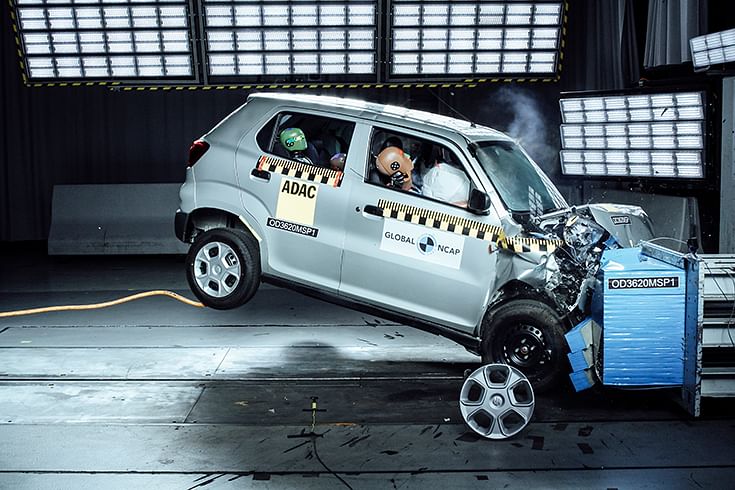
The S-Presso got zero stars for adult occupant protection and two stars for child occupant protection. The S-Presso offers only driver airbag as standard. The high readings in the passenger neck explain the zero star result. However, chest loadings in both front passengers were high and in more updated protocols could also lead to a red chest and a zero stars for this reason as well. Its structure was rated as unstable and should be improved. Its footwell area was rated as unstable as well. Child occupant protection showed poor results for both child dummies in the dynamic test explained by the poor performance of the restraint systems. The car does not offer 3-point belts in all positions as standard and has no ISOFIX anchorages for the Child Restraint Systems (CRS).
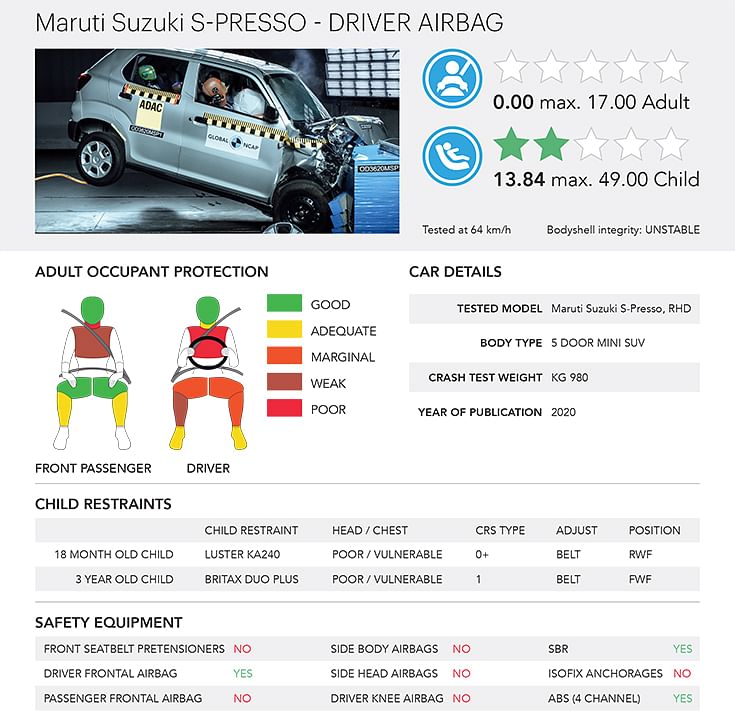
HYUNDAI GRAND i10 NIOS
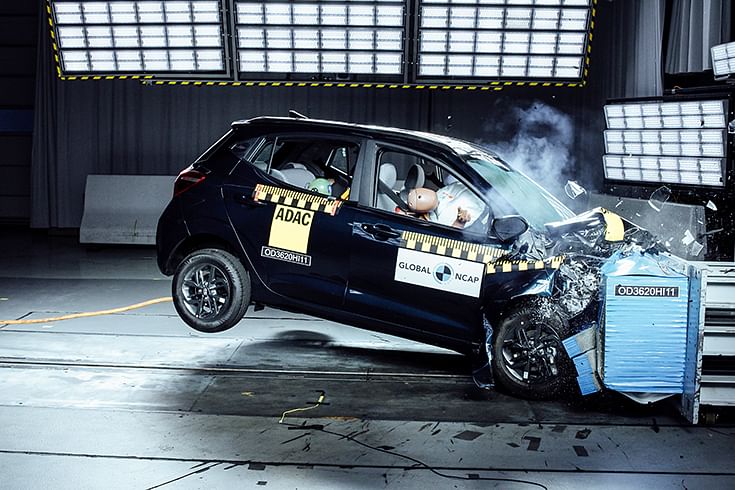
The Grand i10 Nios achieved two stars for adult occupant protection and two stars for child occupant protection. The Grand i10 Nios offers double frontal airbags and pretensioners for both front passengers as standard. Its structure was rated as unstable. Its footwell area was rated as unstable. Head and neck protection for adult occupants was good. Chest protection was weak for the driver and adequate for the passenger leading to limitation of the Seat belt reminder (SBR) points having standard SBR for front passengers.
Child occupant protection showed poor results mainly explained by the decision of the car manufacturer not to recommend the CRSs for the test. Global NCAP is of the opinion that car manufacturers are responsible for all the occupants and child occupants are frequent passengers. Refusing to recommend a CRS for the test raises questions about the car manufacturer policy and relevance towards child occupant protection for the Indian market. The three-year-old dummy showed poor protection for the head due to excessive forward excursion of the head during the crash and a limited chest protection. The 18-month-old showed better protection. The car does not offer standard 3-point belts in all seating positions and does not offer standard ISOFIX anchorages.
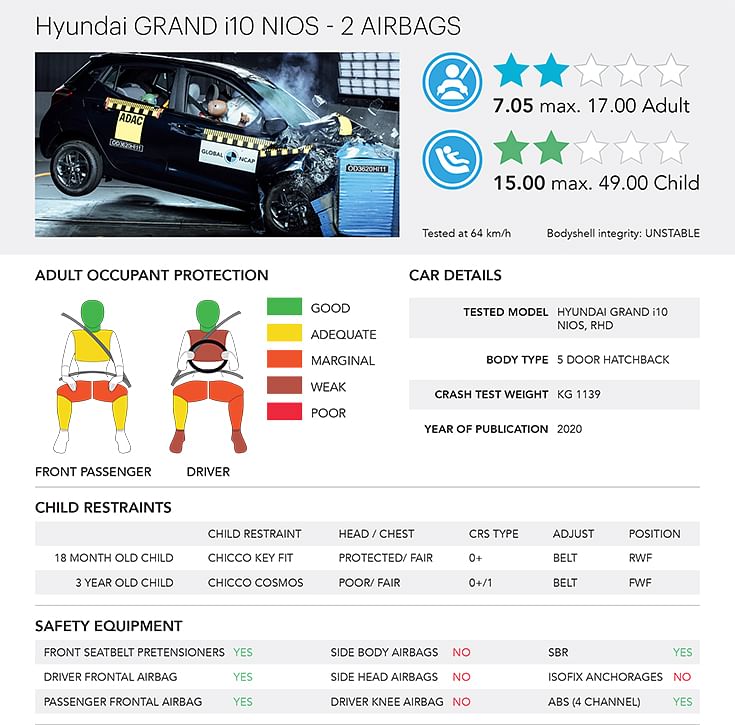
KIA SELTOS
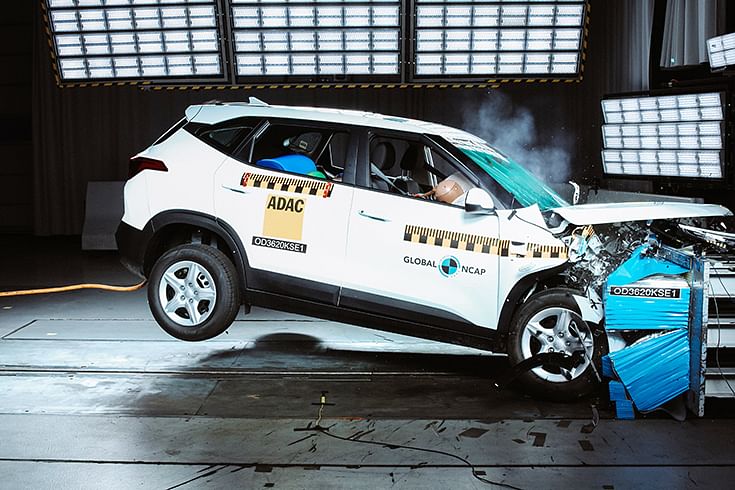
The Seltos achieved three stars for adult occupant protection and two stars for child occupant protection. The Seltos offers double frontal airbag and pretensioners as standard. Its structure was rated as a borderline case unstable. Its footwell area was rated as unstable. Head protection was adequate for both front passengers as both airbags bottomed out during the crash test. Neck protection for adult occupants was good. Chest protection was good for passenger and marginal for driver.
The car offers SBR for the front seating positions. Child occupant protection showed poor results mainly because the manufacturers refused to recommend CRS for the test, and this decision brings the dynamic score to zero. The dynamic performance was poor as the head of the 3 year old showed contact during the rebound face after the impact. The car showed limited protection for the 3 year old head and neck while the 18 month old received acceptable protection. The car does not offer standard 3 point belts in all seating positions and has no ISOFIX anchorages standard.
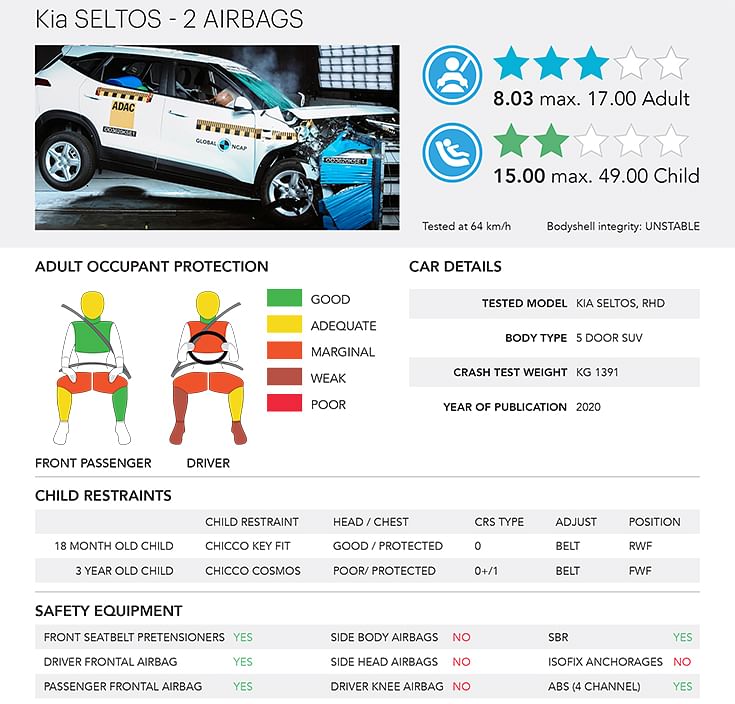
Child Occupant Protection
Global NCAP awards a separate child safety rating to each car in order to highlight the different levels of protection vehicles provide to passengers on the rear seats. Global NCAP tests a combination of the car and child seat recommended by the own car manufacturer. Because the only safe way for young children to travel is properly restrained in a child seat, the assessment checks how compatible the car is with the child seats recommended by the manufacturer, as well as the protection provided in the crash test.
Global NCAP adds, “It is surprising that in the 21st century global car makers are not offering 3-point belts for all occupants with standard ISOFIX anchorages. Lap belts in the middle position make it impossible to properly and safely install a CRS and offer a much lower protection than a three point belt for adults. Airbags are not a substitute for seatbelts, passengers must always wear seatbelts.’
Results from the latest round of Global NCAP crash tests are in stark contrast to those released in the last 12 months. Manufacturers such as Tata Motors and Mahindra secured a full five-star rating for models including the Tata Nexon, Tata Altroz and Mahindra XUV300, with the Tata Tiago and Tata Tigor securing four-star ratings earlier this year.
READ MORE
India-centric NCAP need of the hour: experts at ICAT seminar
RELATED ARTICLES
Cosmo First diversifies into paint protection film and ceramic coatings
The Aurangabad, Maharashtra-based packaging materials supplier is leveraging its competencies in plastic films and speci...
JSW MG Motor India confident of selling 1,000 M9 electric MPVs in first year
The 5.2-metre-long, seven-seater luxury electric MPV, which will be locally assembled at the Halol plant in Gujarat, wil...
Modern Automotives targets 25% CAGR in forged components by FY2031, diversifies into e-3Ws
The Tier-1 component supplier of forged components such as connecting rods, crankshafts, tie-rods, and fork bridges to l...






 11 Nov 2020
11 Nov 2020
 103150 Views
103150 Views












 Autocar Professional Bureau
Autocar Professional Bureau




